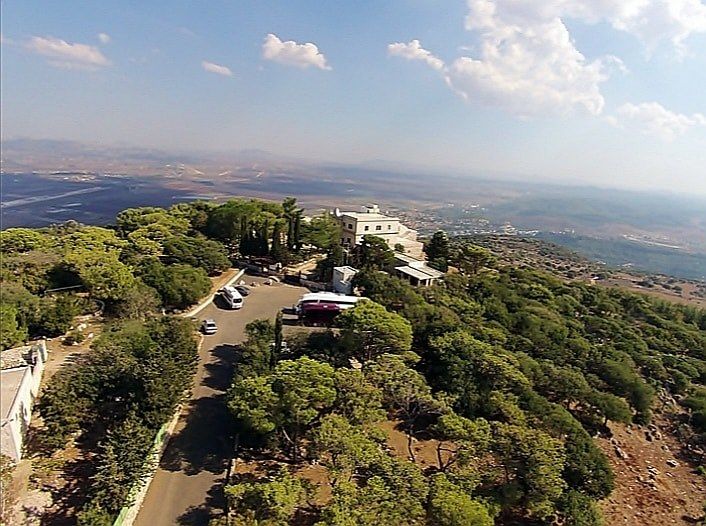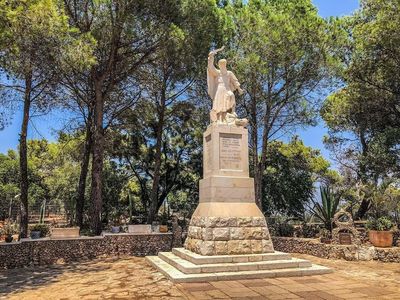Scripture Menu
1 Kings — Go Up!
Elijah said to Ahab, “Go up, eat and drink, for there is a sound of the rushing of rain.” So Ahab went up to eat and to drink. And Elijah went up to the top of Mount Carmel. And he bowed himself down on the earth and put his face between his knees. And he said to his servant, “Go up now, look toward the sea.” And he went up and looked and said, “There is nothing.” And he said, “Go again,” seven times. And at the seventh time he said, "Behold, a little cloud like a man's hand is rising from the sea.” And he said, “Go up, say to Ahab, 'Prepare your chariot and go down, lest the rain stop you.'” And in a little while the heavens grew black with clouds and wind, and there was a great rain. And Ahab rode and went to Jezreel. And the hand of the LORD was on Elijah, and he gathered up his garment and ran before Ahab to the entrance of Jezreel.
Luke 9:27-— They Went Up
Jesus said, “I tell you truly, there are some standing here who will not taste death until they see the kingdom of God.” Now about eight days after these sayings he took with him Peter and John and James and went up on the mountain to pray. And as he was praying, the appearance of his face was altered, and his clothing became dazzling white. And behold, two men were talking with him, Moses and Elijah, who appeared in glory and spoke of his departure [Exodus], which he was about to accomplish at Jerusalem.
Cogitations—
In 1 Kings 17, Elijah the Tishbite appears on the scene in the northern kingdom of Israel. He announces what would become a three-year drought in the Land. It is inferred that he then became a marked man on the run from King Ahab and Queen Jezebel: Adventures with crows in the wilderness and a mission into the enemy region of Tyre and Sidon. During this time of famine, God’s judgment was laden with meaning: The god imported into Israel was the god of fertility, Baal. Baal was the bringer of the rains. Baal made life happen. And yet, there was a drought in the kingdom of Baal.
Forward now to chapter 18, it’s the third year of famine and we are headed to a clash between 450 prophets of Baal and Elijah. Elijah loaded-ly chooses a venue at the top of Mount Carmel. Paradoxically, Carmel maintains its greenery year-round, feigning a natural façade covering the dire circumstances of the rain-less-ness— mirroring the illusion of Baal’s fruitfulness! Perhaps even more significantly, the peak of Carmel is situated in the heart of Baal’s territory, with Tyre and Sidon just to the north, and Samaria to the south. Where better a showdown between Yahweh (God) and Baal, than on Baal’s so-called home (astro)turf?
We know Yahweh wins. Elijah repairs the altar of God with twelve stones, representing the Twelve Tribes of Israel. He arranges the pieces of the sacrificial bull and floods it with three courses of four jars of water (uh, that makes twelve jars!), and then, Shazam! the fire of God (Muhraqa) from heaven falls on the altar, consuming the sacrifice and licking up the water.
Israel witnessed the futility of Baal and beheld the finger of God Almighty in action. They seeeem to “repent.” It says (18:39), “they fell on their faces and said, ‘The LORD, he is God; the LORD, he is God.’” Not only has God whipped Baal, he has judged the wandering hearts of Israel by accepting a sacrifice in their place. Forgiveness has happened and with it, the possibility of reconciliation with God on the top of Carmel.
We haven’t heard a word from King Ahab. He is there. Astonishingly, he too, is included under the cover of this Calvary-like offering. (Let that sink in for a moment.) Presumably, with the king’s consent, the prophets of Baal are hauled down the mountain to the Brook Kishon and “slaughtered.” Could it be- national repentance from top to bottom? And could Israel now be ready for a fresh new beginning?
This is where we need to marvel at the possibilities before Israel. Elijah tells Ahab to “go up” the mountain on Carmel where he eats and drinks joyously, celebrating the end of the famine. This meal renews their covenant community commitments to God. Not coincidentally, the expression “go up” is repeated seven times in this short passage to capture the ambiance of the original covenant ceremony “up” on Mount Sinai in Exodus 24 (more on this below). Elijah, like Moses, “goes up” further to the very top of Carmel, where he prays seven times before the rains make a return to the Holy Land. From God; not Baal!
What happens next seems strange, it says Elijah told Ahab to get back to Jezreel, his summer palace on the edge of the Jezreel Valley, not far from Carmel. Then it says Elijah “girded-up his loins” and ran all the way to Jezreel, ahead of Ahab. This was not a race, but a ceremonial procession at the head of the king’s “motorcade.” The prophet was celebrating national repentance, and he leads the parade to the gates of Jezreel to announce this Good News!
Carmel became a covenant renewal ceremony for the people of God. At the risk of making this blog entry too long, I must risk it! Exodus 24 must needs be quoted at length. Here's the skinny: God meets with Moses and the elders of the people on the mountain just after the giving of the Ten Commandments. God says, (24:1, 9-15): “Come up to the LORD, you and Aaron, Nadab, and Abihu, and seventy of the elders of Israel, and worship from afar. …Then Moses and Aaron, Nadab, and Abihu, and seventy of the elders of Israel went up, and they saw the God of Israel. There was under his feet as it were a pavement of sapphire stone, like the very heaven for clearness. And he did not lay his hand on the chief men of the people of Israel; they beheld God, and ate and drank. The LORD said to Moses, ‘Come up to me on the mountain and wait there, that I may give you the tablets of stone, with the law and the commandment, which I have written for their instruction.’ So Moses rose with his assistant Joshua, and Moses went up into the mountain of God. And he said to the elders, ‘Wait here for us until we return to you. And behold, Aaron and Hur are with you. Whoever has a dispute, let him go to them.’ Then Moses went up on the mountain, and the cloud covered the mountain.”
This is what happened on Carmel. Israel got a divine mulligan! However, things don’t work out as they seemed to be working out. Jezebel rains on the party– pun intended– and calls for the capture of the defiant prophet of God. She wants revenge, and her husband’s repentance evaporates, and he quickly returns to his former badness. Israel's repentance is short-lived.
Elijah escapes to Mount Sinai, wandering through the wilderness of the Negev for forty days and forty nights. He is depressed and discouraged. And why not? He thought he had initiated a new start for the People of God, and it all blew up. It didn't stick. Nevertheless, God appears to the prophet where Moses had stood many years before, and resets the mission. God has not been defeated. His will will be done. There will be a commissioning of an external “thorn” in the flesh for the king and the people in the north (Hazael of Damascus); and there will be an internal threat that will usher an end to the House of Omri and Ahab (Jehu); and finally, there will be a different prophetic touch (Elisha) that will blaze a different kind of ministry in the Land. To underscore this revelation, God experientially demonstrates that He doesn’t need a mighty wind to accomplish his purposes. He doesn’t need a massive earthquake. He doesn’t even need a raging fire to ravage. He can and does move in the “still, small voice.” His Word is sufficient.
In the coming chapters, we will read about this new mission unfolding. But in the meantime, we contemplate the utter failure of Ahab and Israel to come back to God. On the upside, to see how this all plays out, we need to fast-forward to the Lord Jesus Christ on the Mount of Transfiguration. The synoptic Gospels (Mattthew, Mark and Luke) all record this story. Jesus takes Peter, James and John with him up a high mountain where we see Jesus revealing his heavenly glory. He convenes there with both Moses and Elijah. Luke's account adds this juicy detail, that Jesus discussed the “Exodus” he was going to accomplish in Jerusalem. It’s good that Elijah was there to rekindle the joy he had on Carmel. This effort would not fail. Forgiveness and reconciliation would be secured once and for all with the sacrifice on the Cross.
I think the lesson we take from the Battle on Carmel is this: If salvation were up to us to keep, we would lose it (like Ahab and Israel). We need Jesus. We need the Law written on our hearts by the Holy Spirit, as well as His work in growing us in holiness. And of course, we need the grace of God the Father. Always.

An aerial view of the Monastery of Muhraqa on Mount Carmel—
the place where Elijah battled the prophets of Baal.


